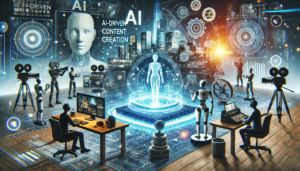How AI Doesn’t Replace Jobs—It Replaces Tasks: The Future-Proof Guide
Introduction: The Reality of Technological Disruption
Worried about artificial intelligence stealing your livelihood? Take a deep breath—AI doesn’t replace jobs, it replaces tasks. This crucial distinction separates those who will thrive in tomorrow’s economy from those left behind.
The technological revolution reshaping our workforce isn’t unprecedented—it’s simply accelerating at a pace we haven’t experienced before.
History demonstrates that economic transitions create more opportunities than they eliminate, though these shifts demand adaptability and foresight.
When we examine emerging technologies objectively, patterns emerge showing which roles face disruption and which become increasingly valuable.
The information era rewards those who leverage AI rather than compete against it.
By understanding this fundamental principle, you position yourself at the intersection of technological advancement and human expertise.
This convergence creates unprecedented career opportunities for those willing to evolve.
Let’s explore how this transformation unfolds and why certain careers—particularly technology sales—stand to benefit tremendously.
We strongly recommend that you check out our guide on how to take advantage of AI in today’s passive income economy.
Table of Contents
The Historical Pattern of Technological Transformation
Technological displacement has reshaped employment landscapes throughout human history, creating efficiencies while eliminating outdated roles.
Our agricultural society once required hundreds of farmhands to produce what a single modern farmer accomplishes with advanced machinery.
The transition from manual farming to industrial mechanization demonstrates how innovation creates different—often better—employment opportunities.
When tractors replaced horse-drawn plows, productivity soared while creating entirely new industries to manufacture, maintain, and improve these machines.
The industrial revolution similarly transformed manufacturing, as assembly lines evolved from manual operations to increasingly automated systems.
Today’s Tesla factory, with its sophisticated robotics, produces vehicles with precision impossible through purely human effort.
Each technological wave eliminated certain tasks while creating new categories of work requiring different skills and knowledge.
This pattern continues with artificial intelligence, following the same fundamental economic principles while accelerating the pace of change.
Jobs Vulnerable to AI Displacement
Transportation and logistics face significant disruption as autonomous vehicles mature, threatening high-paying trucking positions.
These roles—often paying $80,000 to $120,000 annually—may disappear as self-driving technology eliminates the need for human operators.
Legal professions face similar pressures as AI systems increasingly handle document review, contract analysis, and case research with greater efficiency.
Customer service positions continue shifting toward automated systems handling routine inquiries while escalating only complex situations to human representatives.
Administrative tasks across industries face automation as AI systems manage scheduling, documentation, and basic correspondence.
Data entry and analysis roles transform as algorithms process information volumes impossible for human teams to manage effectively.
Routine financial services—including basic accounting, tax preparation, and investment management—increasingly rely on algorithmic solutions.
However, examining these vulnerable positions reveals a critical insight: AI excels at repeatable, predictable tasks while struggling with uniquely human capabilities.
The Essential Traits of Future-Proof Careers
Location independence represents a fundamental advantage in the emerging economy, freeing professionals from geographic constraints.
The ability to serve clients globally while working from anywhere creates unprecedented flexibility and market access.
Working from a Dallas condominium while selling to Oregon clients exemplifies this liberation from traditional geographic limitations.
Transferable skills that transcend specific employers provide security beyond any single company’s fortunes.
When economic downturns trigger layoffs, professionals possessing marketplace-valued skills quickly secure new opportunities.
Performance-based compensation structures reward contribution rather than mere presence, creating unlimited earning potential.
The most resilient careers combine these attributes while leveraging technological advancement rather than competing against it.
These positions thrive precisely because they incorporate AI as a tool rather than viewing it as a threat.
Why Technology Sales Represents the Ultimate Future-Proof Career
Technology sales embodies every attribute of future-proof careers while benefiting directly from technological advancement.
As innovations like OpenAI develop user bases of millions within months, these platforms require sales professionals to penetrate enterprise markets.
The fundamental dynamic remains unchanged: emerging technologies need human representatives to facilitate adoption across industries.
This creates the counterintuitive reality where AI advancement directly creates sales opportunities rather than eliminating them.
While routine sales tasks face automation, relationship-based enterprise sales become increasingly valuable.
The human decision-maker purchasing enterprise solutions requires human representation from the selling organization.
This dynamic persists until hypothetical fully-autonomous organizations emerge—an unlikely scenario requiring artificial general intelligence.
The key distinction lies in transaction value—enterprise sales involving five, six, or seven-figure deals demand human expertise.
The Financial Reality of Enterprise Technology Sales
Enterprise technology sales positions frequently generate total compensation exceeding $300,000 annually for top performers.
Recent six-figure deals demonstrate the lucrative nature of this career path when executed effectively.
Commission structures directly reward performance, creating unlimited upside potential unlike salaried positions.
Remote work flexibility combines with high compensation, creating lifestyle options unavailable in most professions.
The transferability between technology companies provides extraordinary job security despite industry disruption.
When emerging technologies displace existing solutions, sales professionals simply transition to selling the disruptive innovation.
This creates the unusual dynamic where those selling technology benefit regardless of which specific technology dominates.
The combination of location independence, transferable skills, and performance-based compensation creates the ideal future-proof position.
How AI Enhances Rather Than Threatens Technology Sales
Artificial intelligence tools dramatically improve sales effectiveness through automated personalization of prospect communications.
The tedious process of manually customizing outreach based on LinkedIn profiles and company research becomes instant with AI assistance.
Metadata-driven communication templates optimize open rates and response percentages based on proven formulas.
Intelligent account prioritization systems analyze hundreds of potential prospects to identify those most likely to convert.
These tools identify optimal timing based on prospect job changes, company announcements, and digital behavior patterns.
AI-enhanced forecasting analyzes recorded sales conversations to predict close probabilities with unprecedented accuracy.
Voice analysis technology evaluates prospect engagement throughout the sales process, identifying risk factors invisible to human perception.
These capabilities transform sales professionals into superhuman versions of themselves rather than replacing them entirely.
The Competitive Advantage of Early Technology Adoption
Proactive engagement with emerging technologies creates competitive advantages impossible to replicate through delayed adoption.
Those dismissing innovations like OpenAI without exploration repeat historical mistakes made when revolutionary platforms first emerged.
Early Facebook adopters built massive followings while skeptics dismissed the platform as trivial or unnecessary.
Similar opportunities exist today for professionals willing to explore artificial intelligence applications relevant to their field.
Remaining deliberately ignorant about transformative technologies virtually guarantees career obsolescence within years rather than decades.
Creating free accounts and experimenting with AI platforms represents the minimum viable approach to professional survival.
Regular exploration of emerging technologies identifies both threats and opportunities before they become obvious to the mainstream.
This proactive stance transforms potential disruption into strategic advantage through anticipatory adaptation.
Actionable Steps Toward a Future-Proof Career
Developing foundational technology sales skills represents the most direct path toward future-proof employment.
Starting positions in technology sales development provide entry points requiring minimal specialized experience.
Progressive advancement toward enterprise sales positions insulates against automation while maximizing compensation potential.
Concurrent development of AI literacy creates complementary capabilities enhancing sales effectiveness.
Regular experimentation with emerging platforms builds practical understanding impossible through theoretical study alone.
Developing consultative selling approaches focusing on complex problem-solving creates roles resistant to automation.
Cultivating relationship-building capabilities addresses the fundamentally human aspects of enterprise purchasing decisions.
These combined strategies create career trajectories combining immediate benefits with long-term security.
The Economic Opportunity Beyond Current Market Conditions
Current economic uncertainty represents temporary turbulence rather than permanent contraction in technology markets.
Interest rate fluctuations and market corrections create temporary hiring slowdowns while innovation continues accelerating.
Positioning yourself strategically during market corrections creates extraordinary advantages when growth resumes.
Developing advanced capabilities during downturns prepares you to capitalize immediately when markets expand.
Technology adoption continues regardless of economic conditions, though purchasing cycles may temporarily extend.
The fundamental transformation toward AI-enhanced workforces continues regardless of quarterly economic fluctuations.
This creates unprecedented wealth-building opportunities for those positioned correctly when markets rebound.
Strategic career positioning during technological transitions historically creates fortunes for forward-thinking professionals.
Conclusion: Embracing Transformation Rather Than Fearing It
Artificial intelligence doesn’t replace jobs—it replaces tasks, creating extraordinary opportunities for adaptive professionals.
Understanding this fundamental distinction creates clarity amid confusing narratives about technological unemployment.
Technology sales represents the ideal intersection of future-proof attributes and direct benefits from continued innovation.
The combination of location independence, transferable skills, and performance-based compensation creates unmatched career security.
Proactive engagement with emerging technologies transforms potential threats into competitive advantages.
Strategic positioning during market transitions creates wealth-building opportunities impossible during stable periods.
The current technological transformation parallels historical shifts that ultimately created more prosperity than they eliminated.
By embracing rather than fearing these changes, you position yourself to thrive rather than merely survive in the AI-enhanced economy.

We strongly recommend that you check out our guide on how to take advantage of AI in today’s passive income economy.




